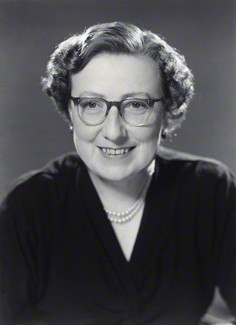Mary Frances Coulshed was born in Sheffield on November 10 1904. Her father Wilfred died in 1911. Her grandfather William and Norman Coulshed’s great grandfather Edmund were brothers. She was educated in Parkfield Cedars school, Derby and at the Convent of the Sacred Heart in Kensington, before becoming a teacher. In 1938 she joined the 1st Derbyshire Company of the newly formed Auxilliary Territorial Service. At the outbreak of war in 1939, she was attached to an anti aircraft regiment. During the war, she was part of new developments in anti aircraft defences on several occasions, for instance helping in the development of 24 hour plotting teams in her searchlight company. Later in the war, when she was more experienced in anti aircraft operations, she trained some of the first women to serve in mixed sex anti aircraft units. In December 1944, she landed in continental Europe in command of five units of anti aircraft gunners. She was the first woman officer to join a mobile operational headquarters in wartime. This was also the first time that mixed sex units had been deployed in a war zone in Western Europe. As the Allied made slow progress towards the Rhine, her units were under constant threat from the German V1 and V2 rockets. One of the units under her command was credited with destroying 19 of the German rockets. She was mentioned in dispatches, and was later awarded the Order of Leopold I with palm by Belgium and the Croix de Guerre with palm by France. She returned to England in December 1945. She was Deputy Director Anti Aircraft Command from 1946 to 1950, and then in 1951 was appointed Director of the Womens Royal Army Corps, which had replaced the ATS in 1949. During her time as director, the WRAC increased in strength, and the first permanent WRAC staff college was established at Frimley Park near Camberley. She was appointed CBE in 1949, advanced to DBE in 1953. She retired from the Army in 1954, and then worked for a time in telecommunications. She maintained her links with the WRAC, donating a number of books to the corps headquarters. Frances Coulshed was known as a popular, friendly person with a strong sense of humour, and a respected and effective leader. She loved flowers and cats. She remained unmarried, and was essentially a private, self contained individual whom few of her Army contemporaries knew well. She died on September 28 1998 aged 93.

